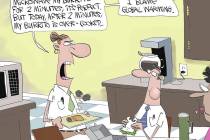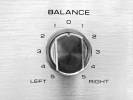Democrats against democracy
Ralph Nader has a talent for upsetting people.
The activist first broke into public awareness with his 1965 book about General Motors' Corvair, "Unsafe at Any Speed." At the time, General Motors hired private investigators to turn up dirt on Mr. Nader in an attempt to discredit him. They even hired prostitutes. In the end, that effort failed (was it the gals' failure to wear Earth Shoes?). In 1970, GM gave up and paid him a $475,000 settlement.
Now, Nader says he's run into someone nastier than GM.
The Democratic Party.
Democrats bear a grudge because Mr. Nader, running for president on the Green Party ticket in 2000, drew 90,000 votes in Florida. George W. Bush ended up taking the Sunshine State's vital Electoral College votes when he defeated Democratic nominee Al Gore by 537 votes. "There's no question that Nader cost Gore the election," says Larry Sabato, the director of the Center for Politics at the University of Virginia.
In 2004, Mr. Nader sent out petitioners to get him on the ballot again -- and ran into a buzz saw in the state of Pennsylvania.
Democratic activists kept him off the ballot there, beating him in court for turning in fraudulent ballot-access petition signatures. Reed Smith is the Pittsburgh law firm that brought the case, purportedly on behalf of a group of injured voters. But the court reporters, stenographers and handwriting experts required to prove the Nader campaign failed to submit 25,697 valid signatures were costly, explains Efrem Grail, a partner at Reed Smith. So the firm now threatens to freeze Mr. Nader's personal bank account if he doesn't hurry up and pay them $61,000 in court-approved costs.
"Mr. Nader owes us some $60,000 to $70,000, and it's time for him to pay," says Mr. Grail.
Gregory Harvey, a Philadelphia lawyer who's also part of the case, told McClatchy Newspapers he's an unabashed Democrat and was motivated by one thing: "I wanted to prevent Ralph Nader from doing what he did in Florida in 2000."
T.J. Rooney, chairman of the Pennsylvania Democratic Party, said this week that the mere mention of Mr. Nader's name sent his blood pressure up 50 points. Told of the judgment against Mr. Nader, Mr. Rooney laughed. "I think that's great. You're goddamned right he should pay, and he should go away, because he didn't learn his lesson in 2000."
Learn his lesson? What lesson? That citizens not anointed by the power structure of the two major parties should stop trying to be heard at campaign time?
Mr. Nader has millions of dollars in stock holdings. He's not likely to end up in the street. But that, he says, isn't the point. "Yes, I can afford it," he said, "but the necessity of a diversified electoral process can't afford it."
Such vindictive use of the courts has left him feeling disenfranchised, excluded from the American political process, much as African-Americans once were. "It's like the 1930s," Mr. Nader says. "Not even GM did this to me. ... It's political bigotry of enormous proportions."
Not quite. But such a use of the courts to gain political comeuppance and discourage future challenges -- the plaintiffs don't even deny those motives -- is certainly disturbing.
Nobody should be faking petition signatures. But the nation's arcane ballot access laws -- requiring that political "outsiders" pay hundreds of thousands of dollars to freelance petition-passers to get what "established" candidates with "D" or R" after their names get for free -- ought to be pared down, made both more affordable and easier to understand and obey.
The curious thing is that people like Pennsylvania's T.J. Rooney don't seem to favor such reforms.
Why not? Wouldn't that make the whole process more ... "democratic"?























